-
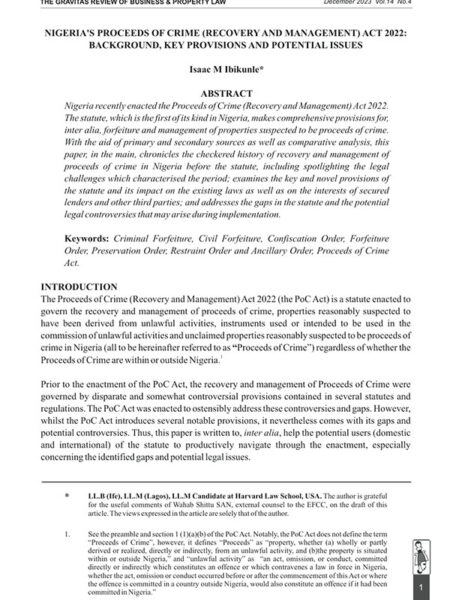
Nigeria’s Proceeds of Crime (Recovery and Management) Act 2022: Background, Key Provisions and Potential Issues
0₦2,500.00Isaac Ibikunle, in his article, Nigeria’s Proceeds of Crime (Recovery and Management) Act 2022: A Review of Key Provisions and Issues Arising, examines Nigeria’s recently enacted Proceeds of Crime (Recovery and Management) Act 2022. The statute, which is the first of its kind in Nigeria, makes comprehensive provisions for forfeiture and management of properties suspected to be proceeds of crime. With the aid of primary and secondary sources as well as comparative analysis, Ibikunle chronicles the checkered history of recovery and management of proceeds of crime in Nigeria prior to the statute, including spotlighting the legal challenges which characterised the period; examines the key and novel provisions of the statute and its impact on the existing laws as well as on the interests of secured lenders and other third parties; and addresses the gaps in the statute and the potential legal controversies that may arise during implementation.
-
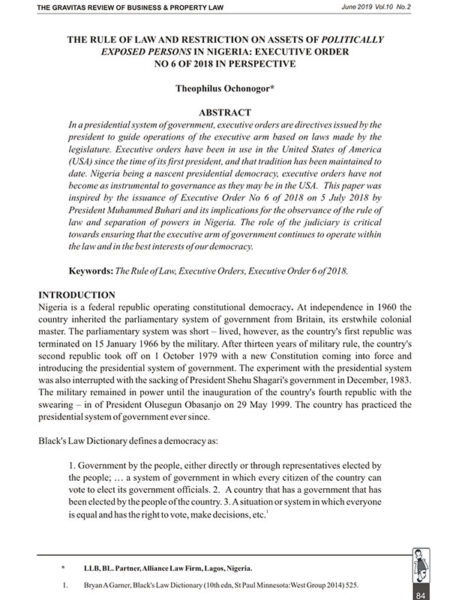
The Rule of Law and Restriction on Assets of Politically Exposed Persons in Nigeria: Executive Order No.6 of 2018 in Perspective
0₦2,500.00Theophilus Ochonogor, Partner, Alliance Law Firm, Lagos Nigeria in The Rule of Law and Restriction on Assets of Politically Exposed Persons in Nigeria: Executive Order No. 6 of 2018 in Perspective, reviews the constitutionality of Executive Orders (EO) generally, and EO6 specifically. Theophilus explores the jurisprudential history of Executive Orders, relevant cases on the issue, and argues that EO6 which empowers the Attorney General to preserve and protect from dissipation the assets of current or former government officials, or any politically exposed person is arbitrary, an usurpation of judicial powers, and an assault on the country’s constitutional democracy.
-
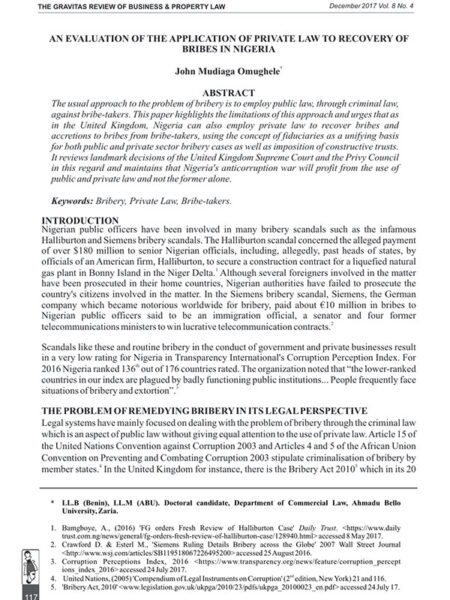
An Evaluation of the Application of Private Law to Recovery of Bribes in Nigeria
0₦2,500.00John Omughele, Legal Practitioner and researcher, in his article, “An Evaluation of the Application of Private Law to Recovery of Bribes in Nigeria”, notes that the usual approach to the problem of bribery is to employ public law, through criminal law, against bribe-takers. He highlights the limitations of this approach and argues that as in the United Kingdom, Nigeria can also employ private law to recover bribes and accretions to bribes from bribe-takers, using the concept of fiduciaries as a unifying basis for both public and private sector bribery cases, as well as imposition of constructive trusts.
-
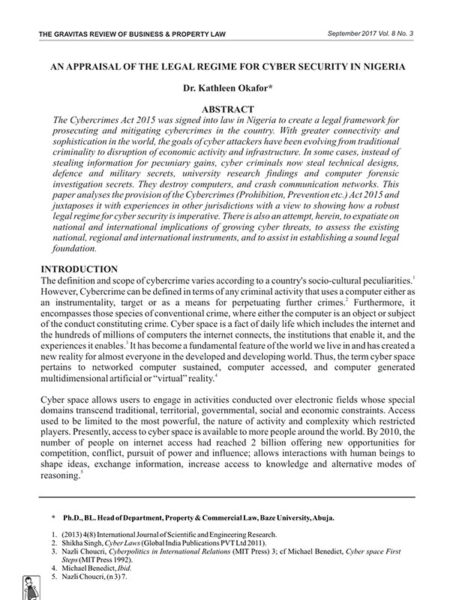
An Appraisal of the Legal Regime for Cyber Security in Nigeria
0₦2,500.00With greater connectivity and sophistication, the goals of cyber attackers have been evolving from traditional criminality to disruption of economic activity and infrastructure. In some cases, instead of stealing information for pecuniary gains, cyber criminals now steal technical designs, defence and military secrets, university research findings, and investigation secrets. Dr. Kathleen Okafor, Head of Department, Property & Commercial Law, Baze University, Abuja in her article, “An Appraisal of The Legal Regime for Cyber Security in Nigeria”, comprehensively reviews the existing national legal regime for cyber security, and assesses how regional and international instruments seek to make the world a safer place.
-
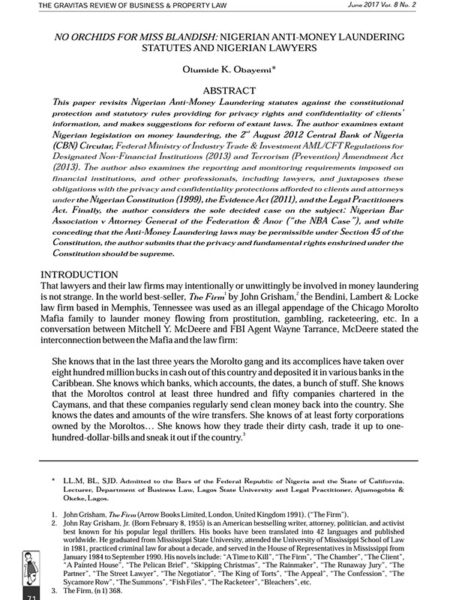
No Orchids For Miss Blandish: Nigerian Anti-Money Laundering Statutes and Nigerian Lawyers
0₦2,500.00Dr Olumide Obayemi of the Lagos State University and Legal Practitioner, Ajumogobia & Okeke, Lagos in his article, “No Orchids For Miss Blandish: Nigerian Anti-Money Laundering Statutes and Nigerian Lawyers” examines the concept of money laundering and comprehensively reviews extant Nigerian legislation and regulations on money laundering including the 2 August 2012 Central Bank of Nigeria Circular, Federal Ministry of Industry Trade & Investment AML/CFT Regulations for Designated No the Terrorism (Prevention) Amendment Act (2013). He examines the reporting and monitoring requirements imposed on financial institutions, and other professionals, including lawyers, and juxtaposes these obligations with the privacy and confidentiality protections afforded to clients and lawyers under the Nigerian Constitution (1999), the Evidence Act (2011), and the Legal Practitioners Act. He considers the case of the Nigerian Bar Association v Attorney General of the Federation on the issue and draws his conclusion.
-
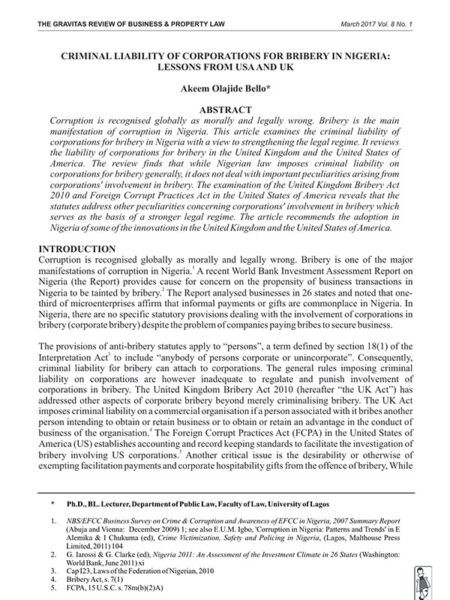
Criminal Liability of Corporations for Bribery in Nigeria: Lessons from USA and UK
0₦2,500.00Dr Akeem Bello of the Department of Public Law, University of Lagos in his article “Criminal Liability of Corporations for Bribery in Nigeria: Lessons from USA and UK” examines Nigerian law on bribery and posits that there is no specific legislation designed to criminalise corporate bribery. He examines the criminality of ‘Facilitation Payment’ and ‘Corporate Hospitality’ and recommends that expanding the scope of bribery offences to cover all “persons”irrespective of whether they are public, private sector officials or corporate entities will strengthen the law on bribery in Nigeria.
-
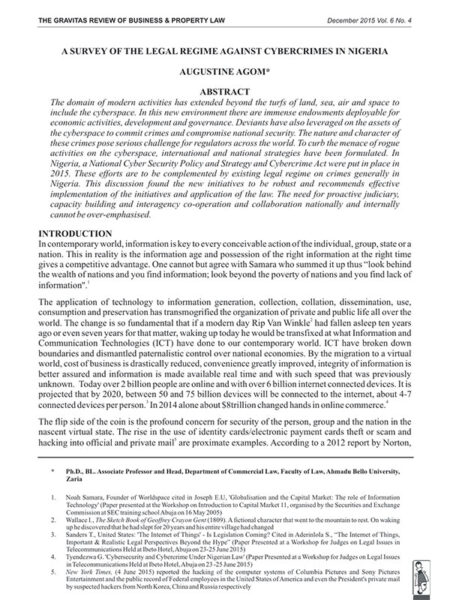
A Survey of the Legal Regime against Cybercrimes in Nigeria
0₦2,500.00Augustine Agom, Associate Professor of Law and Head, Department of Commercial Law, Ahmadu Bello University, Zaria in “A Survey of the Legal Regime against Cybercrimes in Nigeria” analyses the nature and character of cybercrimes and the provision of various laws having bearing on cybercrimes including the Cybercrimes (Prohibition, Prevention Etc.) Act 2015.
-
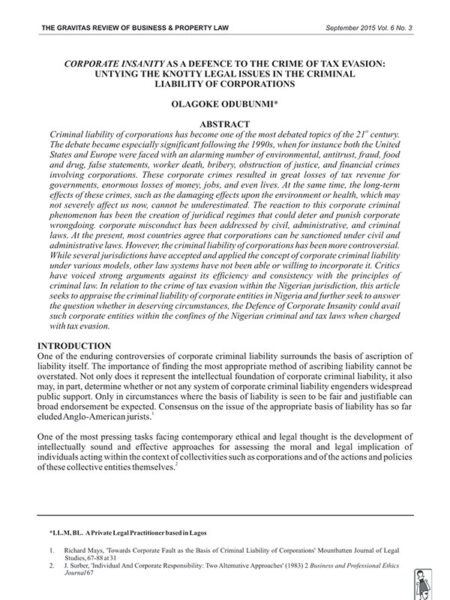
Corporate Insanity as a Defence to the Crime of Tax Evasion: Untying the Knotty Legal Issues in the Criminal Liability of Corporations
0₦2,500.00Odubunmi Olagoke in his article “Corporate Insanity as a Defence to the Crime of Tax Evasion: Untying the Knotty Legal Issues in the Criminal Liability of Corporations” explores the various theories of criminal liability and consider, from a distillation of the principles, the defence of Corporate Insanity to a crime of tax evasion.
The Gravitas Review of Business & Property Law



